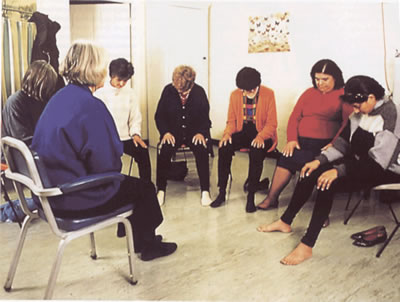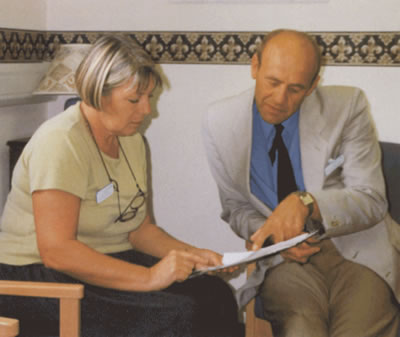Positive Health Online
Your Country

Add as bookmark
The Finest of Arts
by Hermione Elliott(more info)
listed in nursing, originally published in issue 24 - January 1998
The unity they have come to see which exists between body, mind and soul no longer fits so well within a twentieth century nursing philosophy; one which has embraced so wholeheartedly scientific principles and academic excellence over and above the art of nursing. However in turning to Florence Nightingale,[1] who many consider to have embodied the spirit of nursing, we see she had no such qualms:

Autogenic Training Class.
Nicky and Elissa are among a growing band of nurses who have not lost touch with these sentiments many of whom are members of The Holistic Nurses Association (HNA). They place equal value on addressing the physical, emotional, psychological and spiritual needs of their patients, and are aiming to strike the balance, bringing the best of the traditional and modern into their practice.
Elissa works at The Royal Victoria Infirmary in Newcastle, nursing people who are gravely ill, requiring an extremely high level of care and in an area which relies heavily on the use of advanced technology – the Intensive Care Unit (ICU). For her there is no contradiction: “In fact I chose to work in ICU because there is time for individual care and I would not have to try and spread myself as thinly as I would on a general ward.”
She entered nursing at 35, as a mature student, with a broad view of life and clear idea of what nursing should be. Even so it has not been easy for her, much of the time she has felt isolated and a lone soul within a profession which places a high emphasis on physical care, but pays only lip service to the mind and spirit. She has found the problem is: “When you talk about spiritual care it is always equated with religion – even if the patient isn’t religious.” Similarly the term ‘holistic care’ is commonly used, but she feels it is misunderstood – “In nursing we equate holistic with complementary therapies but I don’t believe it equates with what you offer (as treatment), it’s more about how you see the person.”
It is also about how you are. Elissa explains that in ICU, nurses have an unusually intense relationship with their patients. Patients are mostly dependent upon respirators and other machinery for their survival and ICU nurses are needed to be technicians as well as carers, as a consequence they never leave the bedside. Patients are often sedated or unconscious, therefore communication, except by the squeeze of a hand, the flicker of an eyelid or a facial expression, is barely possible: “ICU nurses become expert at reading eyes, or drawing on their intuition to assess the emotional state of the person they are with.”
However, she believes her holistic perspective helps when communication goes the other way. It is all too easy to forget there is a human being among the bleeps and bottles and she has come to see that once the technical routines have been completed her most important task is to “be with” her patient; to simply hold their hand, to talk to them, to be unafraid of their suffering, to be a calm influence amongst the turmoil of their feelings and the medical paraphernalia. It is in this very simple human interaction that some peace can be gained.
Much of the effort which goes into intensive care is directed at restoring people to the same level of health that they experienced before their illness. Her view is that anyone who has been ill enough to warrant intensive care has been through an experience which is traumatic, profound and life-changing. Even if they become fully healthy, they will never be the same person again. She believes we need to help people integrate the changes and to move on in a new way.
Elissa practices healing and is a member of The National Federation of Spiritual Healers, but it is rare for her to he able to use this in her work. She often gives healing to her colleagues and patients’ relatives, and this creates a tremendously supportive atmosphere within the unit, but only occasionally is she asked to give healing to a patient. She feels this is largely due to a lack of awareness of the concept of healing and the need for the medical staff and nursing administration to have some proof of its effectiveness before giving permission. This is disappointing when there are volumes of well documented research already available to support its validity. However, within the hospital she is beginning to be known for her views and colleagues come to her regularly for healing as a means of managing stress.
Nicky Baker is also someone becoming known for her views throughout her hospital. She says: “I am a bit flamboyant, I don’t conform, so I am sometimes at odds with current thinking, but I am still able to maintain my integrity and practice my own way. I am accepted and more sought out these days and I am getting a reputation in the hospital for the way I think.” As an Oncology and Haematology Support Nurse within South Devon Health Care Trust, Nicky has carved out a unique niche for herself. She works with patients who have malignant conditions and are undergoing chemotherapy and through her support role is able to bridge conventional, complementary and holistic approaches.

Nicky Baker & Hospital Chaplain Gordon Kendall discussing a spirituality workshop.
It seems Nicky and Elissa like many holistic nurses have along the way, trodden a lonely path. From the start of her nursing training in 1965 Nicky has always looked beyond the medical condition to the whole person. She was often teased by her peers (who felt she should be a social worker instead of a nurse), because she spent time talking to people, finding out about their home life, sometimes discovering their situation wasn’t at all suitable to return to after discharge. Even though she wouldn’t have been able to articulate it back then, she believes she has always been a holistic nurse.
Nicky’s personal and professional journey have been closely intertwined and in the last 10 years it is the spiritual aspect in each, which has come to the fore. She was very influenced by Rita Benor (the founder of the HNA in Britain) when she attended a talk on stress and for the first time recognised the profundity of the link between mind and body. She said: “It was like a light going on. . . ‘I want to know more about this!’” It was at this point she decided to take a course in counselling, which had the effect of a wake up call. She revelled in her discovery of humanistic psychology which gave form to her own beliefs and most exciting of all this new-found knowledge was not simply theoretical, it was experiential; and the experience changed her. Later she attended a spiritual awareness and healing weekend which she describes:”This time it was like a fluorescent tube going on! As we studied the chakra system, something profound happened to me. I started to shake and cry, it was as if something in me knew it already, but had not been awakened.”
The depth and importance of these discoveries gives Nicky the impetus to continue with her personal development. “By learning to honour my intuition and follow my feelings, opportunities present themselves, and I learn and develop more from them.” All this has given her a unique perspective, much of which she is able to share with her patients. She believes she is in exactly the right place, doing the right thing and has found the cancer world particularly, generates a deeper involvement with patients and families which makes it easier for her to practise holistically.
She spends much of her time supporting patients using counselling, enabling them to explore their understanding of their illness and what they might want to change. She runs a regular relaxation and support group and sees first hand how beneficial it is. She finds people enjoy the feeling of regaining some control over their lives and somehow it helps them get in touch with their own intuition; as a consequence they are more readily able to know what it is they need. The only constraint she feels in her work is that institutions like the NHS do not allow for individuality, amongst patients and staff alike. Despite this it seems she has succeeded in doing a great deal, clearly with a growing respect from her patients and colleagues.
Both Elissa and Nicky believe the true art of nursing must not be sacrificed in order to accommodate the trend to mechanise care and the demands from managers for evidence based practice, which usually requires a quantitive evaluation of what is a qualitative experience. Unfortunately the current ethos in nurse training, where there is more emphasis on the intellectual and academic than on the practical and intuitive, does not bode well. Nicky says: “There is a huge difference between learning something theoretically and feeling/ knowing it”. Elissa, who has a BA in Health Studies and is no stranger to the academic world, suggests there needs to be more emphasis on personal as well as professional development: “to enable nurses to become more comfortable with themselves. If their self-awareness is increased they are more likely to have an awareness of others and be better able to help them.” She has seen colleagues who have needed to back away from situations which have been too painful, cost too much personally. “It is hard to stay there with people’s sorrow, anger or silence.”
They also advocate the need for nurses to care for themselves. If we are to support the HNA submission that “health proceeds from a balance of physical, emotional, spiritual, psychological and social needs”, and that “our wholeness is dependent upon our relationship to each other, our environment and that which gives our lives meaning”, nurses must include themselves in the equation.[2]
Elissa and Nicky have demonstrated holistic nursing surely does begin with an open mind and a willingness to grow personally, as well as exploring what well-being means for themselves and their patients. When nurses embark upon this journey they experience the kind of relationship, based upon human values and a sense of equality with their patients, that is truly therapeutic. Professor of Nursing, Stephen Wright asserts: “The healing energy that is released when the right relationship emerges is awesome in its impact. When we get the relationship right everything else falls into place. The therapy, the (nursing) process, the model, becomes an add on, not an end in itself.”[3] It appears when nurses incorporate this level of ‘being’ with whatever they ‘do’, the rewards are very great for all concerned. If we ever have the misfortune to require it, who wouldn’t want to be on the receiving end of this kind of conscious loving care?
References
1. Nightingale F; cited in Holistic Nursing – a Handbook for Practice Dossey BM; Keegan L; Guzzetta CE; Kolkmeier LG; Aspen Publishers 19952. HNA definition 1993 HNA (UK) Newsletter Vol I (1) 1993.
3. Wright S; Nurse Heal Thyself HNA (UK) Newsletter Vol 2 (4) 1995.
Further Information
The Holistic Nurses Association may be contacted by Tel: 01743 242466 Fax: 01743 353637. Rowland Thomas House, Royal Shrewsbury Hospital South, Shrewsbury, Shrops. SY3 8XF.
Comments:
-
No Article Comments available